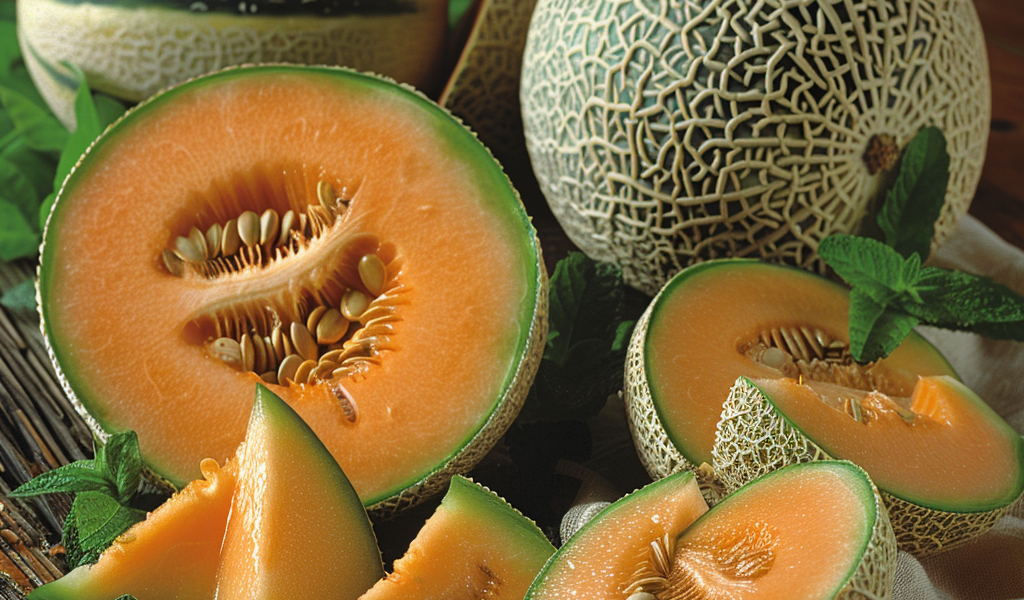As summer approaches, melons become a staple in many households, with cantaloupe and honeydew leading the pack. These juicy fruits not only tantalize taste buds but also pack a nutritional punch. With their peak season running from May through September, it’s the perfect time to explore the unique benefits of each.
Nutritional Comparison: Cantaloupe vs. Honeydew
Both cantaloupe and honeydew are low-calorie options that can enhance your diet. However, they do have distinct nutritional profiles. Here’s a breakdown of their nutritional content per cup:
- Cantaloupe:
- Calories: 59
- Fat: 0 grams
- Carbohydrates: 13 grams
- Fiber: 1 gram
- Protein: 1 gram
- Vitamin A: 360 micrograms
- Vitamin C: 59 milligrams
- Folate: 21.7 micrograms
- Potassium: 243 mg
- Honeydew:
- Calories: 56
- Fat: 0 grams
- Carbohydrates: 14 grams
- Fiber: 1 gram
- Protein: 1 gram
- Vitamin A: 4.65 micrograms
- Vitamin C: 28 milligrams
- Folate: 29.4 micrograms
- Potassium: 353 mg
While both fruits are excellent for hydration, cantaloupe stands out for its high vitamin A content, providing 40% of the daily recommended intake in just one cup. This vitamin is crucial for maintaining healthy eyesight and supporting immune function.
On the other hand, honeydew offers slightly more carbohydrates and potassium, which is beneficial for muscle function and maintaining blood pressure levels. Both fruits are rich in water content, with each cup containing approximately 5 ounces of water, making them ideal for hydration.
The Importance of Hydration
Staying hydrated is essential for overall health. Even mild dehydration can lead to negative effects on mood, energy levels, and cognitive performance. Research suggests that proper hydration can help prevent chronic illnesses and may even contribute to a longer life.
Incorporating fruits like cantaloupe and honeydew into your diet is a delicious way to boost your hydration levels. Most people do not consume enough fruits and vegetables daily, and adding these melons can help increase your intake of essential nutrients.
Health Benefits of Cantaloupe
The high vitamin A content in cantaloupe is particularly noteworthy. This vitamin plays a vital role in maintaining good vision, especially in low light. Additionally, vitamin A is essential for skin health and may help in the prevention of certain diseases.
Cantaloupe is also a great source of vitamin C, which is important for the immune system, skin health, and the absorption of iron from plant-based foods. The folate content in cantaloupe supports DNA synthesis and repair, making it essential for cell division and growth.
Health Benefits of Honeydew
Honeydew, while lower in vitamin A, offers a wealth of other nutrients. Its higher potassium content is beneficial for heart health, as it helps regulate blood pressure levels. The presence of vitamin C in honeydew also supports the immune system and aids in collagen production, which is crucial for skin elasticity.
Moreover, honeydew’s slightly higher fiber content can contribute to digestive health, helping to maintain regular bowel movements and prevent constipation.
Incorporating Melons into Your Diet
Both cantaloupe and honeydew can be enjoyed in various ways, making them versatile additions to your meals. They can be eaten fresh, added to fruit salads, blended into smoothies, or even used in savory dishes. For a refreshing treat, try freezing chunks of cantaloupe or honeydew for a cool snack on hot summer days.
Additionally, these melons can be paired with other fruits, yogurt, or cottage cheese for a nutritious breakfast or snack. Their natural sweetness makes them a healthier alternative to sugary desserts.
Final Thoughts on Melons
With their unique flavors and impressive health benefits, cantaloupe and honeydew are excellent choices for anyone looking to enhance their diet. Whether you prefer the rich, sweet taste of cantaloupe or the mild, refreshing flavor of honeydew, both fruits offer a delicious way to stay hydrated and nourish your body.
This summer, make sure to include these melons in your shopping list. Not only will they add a burst of flavor to your meals, but they will also contribute to your overall health and well-being.





